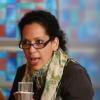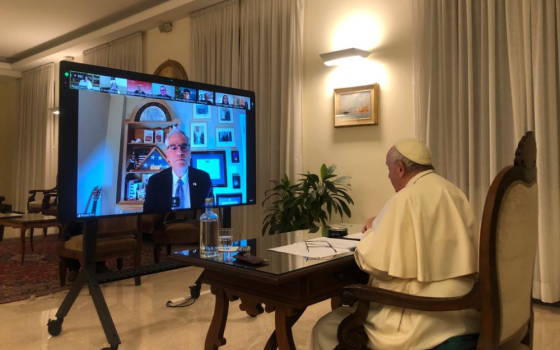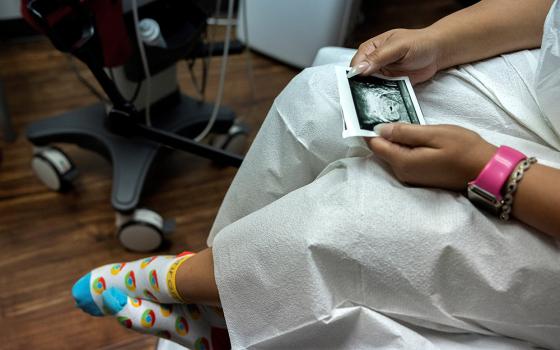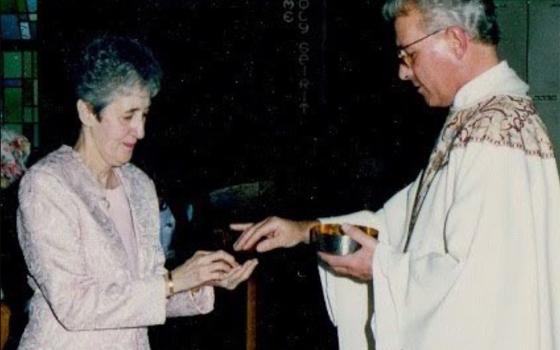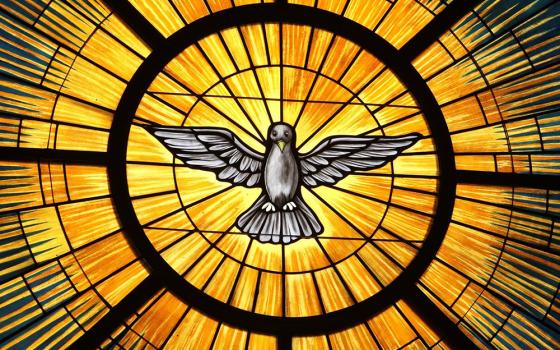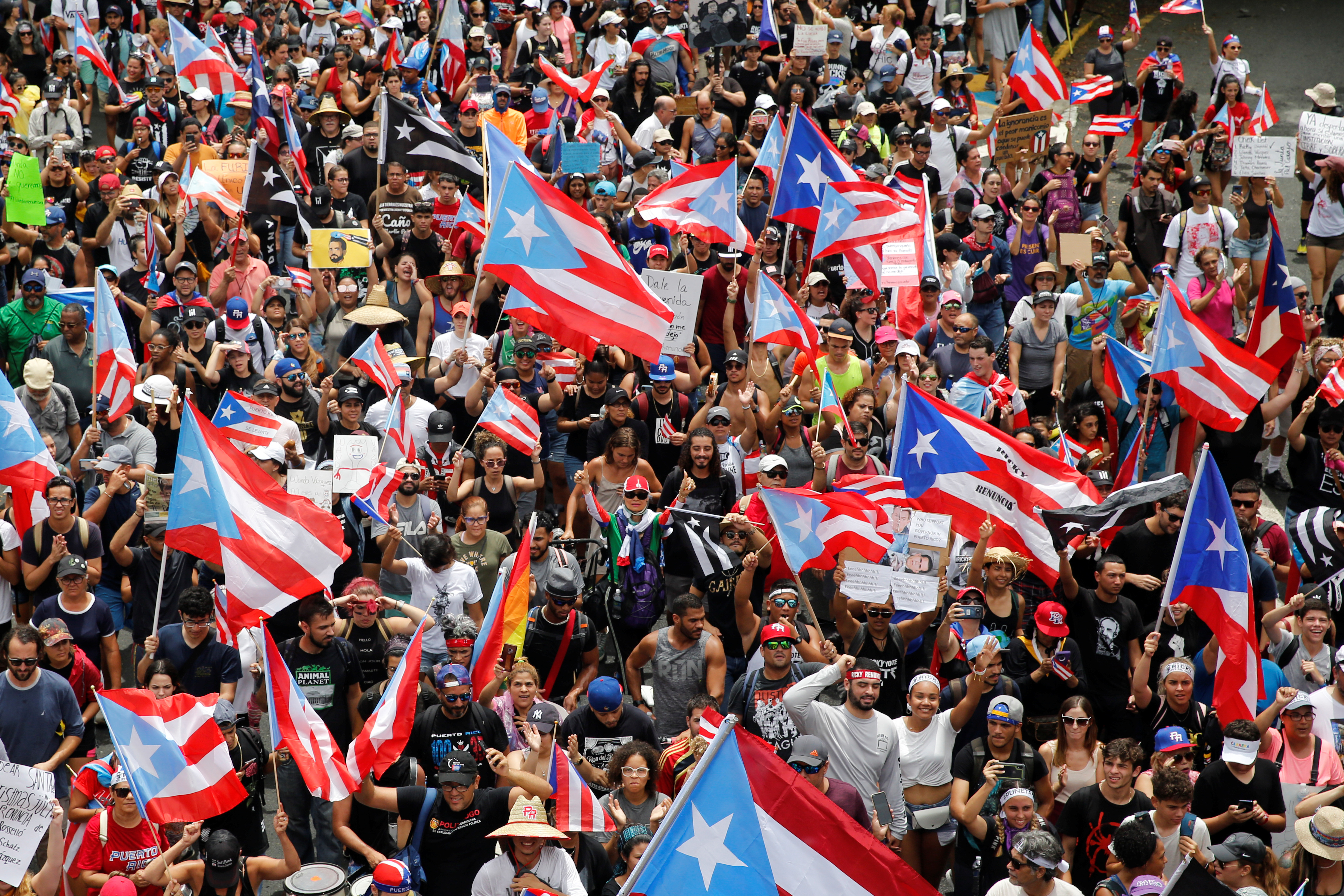
People join a rally to celebrate the resignation of Puerto Rican Gov. Ricardo Rosselló in San Juan July 25, 2019. The Puerto Rican bishops said July 24 that in the wake of the historic resignation island residents must continue to maintain their unity to overcome the social ills that led to the political and economic crisis. (CNS photo/Reuters/Marco Bello)
La fé se vive de pié. Faith is lived on your feet. On whatever motors your body. Faith calls the body to become incarnate in the realities in which Christ too becomes incarnate. These past few weeks have seen tremendous movimiento – movement. People of faith, of all ages, abilities, sexual orientations, religious traditions, genders and ethnicities have mobilized! They moved into spaces and advocated for dignity — their own and others. They clamored in the streets and in the halls of political power for human rights for those who are held captive. They bore on their bodies and in their witness some of the injustices being heaped upon the most vulnerable.
On July 18 various groups organized a Catholic Day of Action for Immigrant Children. The group included women religious, priests and laity who moved on and into the privileged space of Capitol Hill to cry out for the children who have died in the custody of Border Patrol and immigrant detention centers, to demand the reunification of families and the cessation of detaining children at the border. Over a year after the current administration's family separation policy was put in effect, immigrant children continue to be separated from their families, detained in horrendous conditions, with very uncertain futures and little hope of being reunited with their loved ones. This reality ought to move Christians in the same way that the Samaritan was moved to cross the road to aid the victim in the gospel of Luke.
Those participating in the Catholic Day of Action carried with them images of the children who have died after desperately risking their lives over harsh terrain in order to get to what their families believed was the safety of the USA. Protestors marched, living their faith "on their feet" while bearing the images of migrant children and chanting aloud God's love of migrants as affirmed in the Bible. Some went further by engaging in acts of nonviolent civil disobedience, laying in a cruciform on the floor of the Russell Senate Office Building representing a cross of migrant bodies. Seventy-one of them were arrested, including members of the clergy and women religious.

Catholic leaders and advocates protest the Trump administration's handling of detained immigrant children during a "Catholic Day of Action for Immigrant Children" July 18, 2019, in the Russell Senate Office Building in Washington. (CNS photo/Tyler Orsburn)
In Puerto Rico, citizens from all over the island took to the streets protesting for 15 days. They demanded the resignation of the governor, Ricky Roselló, whose private chat messages with top officials mocked the LGBTQ+ community, threatened government officials and journalists trying to uncover various levels of corruption and fraud, joked about the loss of life and suffering after Hurricane Maria, and made sexist and violent remarks against certain women activists. Again, people of faith, among others, found ways to become incarnate in the pain of the people. They wrote individual and joint messages asking for governor Roselló's resignation. They lifted up the communities targeted by the chats and victimized by political corruption and the mismanagement of the recovery efforts following the devastation caused by Hurricane Maria. The Catholic bishops of Puerto Rico joined the national call for Roselló's resignation citing the crass violations to human dignity that such corruption and disrespect represent.
On July 22 over a million Puerto Ricans took their call for justice and accountability from their government to the streets, the biggest protest in the history of the island. Visible amidst the protesters were pastors, priests, laity, women religious and the faithful from various traditions and communities. Bishop Rubén González Medina of the Diocese of Ponce and Bishop Eusebio Ramos Morales of Caguas spoke clearly that their place was with the people of Puerto Rico, who were agitating for justice and respect at a crucial time in their history.
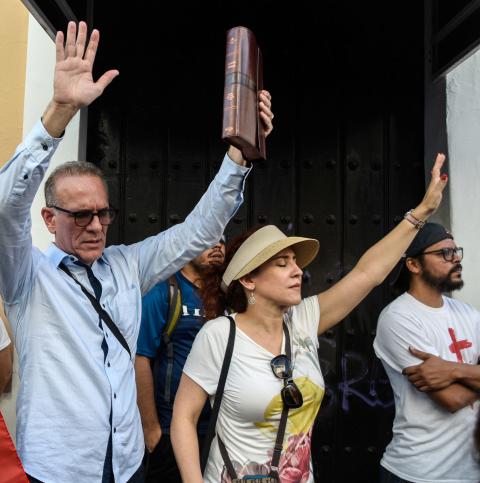
Demonstrators prayed during protests calling for the resignation of Gov. Ricardo Rosselló in San Juan, Puerto Rico, July 21, 2019. (CNS photo/Reuters/Gabriella N. Baez)
These two moments of people living their faith "on their feet," illustrate the power of movimientos, clamoring for the dignity and human rights of marginalized communities. They echo each other in their clarity of vision and resolve. These incarnated actions affirm for me the sense that faith is something best "lived on one's feet," la fé se vive de pié, constantly responding to the stirrings of the Spirit to "enter the chaos of another" like the Good Samaritan does. From the beginning of his papacy, Francis seeks out the various places where communities of marginalized persons are struggling to live with dignity, love and respect. In his visits within and outside of Rome, migrants and the politically disenfranchised represent a priority. Through these visits he witnesses to a key mark of his understanding of what it means to be church, to go out into the streets, to minister among the sheep, to always keep the doors open.
Participation in movements and protests are a hallmark of many Christian communities, as evident in the examples of the March for Life held every January since 1974, and in the various movements for peace and disarmament since the height of the Cold War. And yet many Christians often feel that risking arrest or participating in protests that paralyze business and traffic run against the social order and therefore are contrary to Christian ways of being. This prioritizing of order can easily mask an aversion for publicly standing up for the central value of the human dignity of all, especially if it means confronting the political establishment.
The Catholic Day of Action and the 15 days of protests in Puerto Rico give me hope that Christians are moved — on whatever motors their bodies — to put human dignity first, clearly and unequivocally, to take on some of the suffering of those who are marginalized and oppressed, to demand change and respect for human rights. We have permission, indeed we are called to "live our faith on our feet" sometimes in ways brazen and subversive, for the sake of the dignity of all.
[María Teresa (M.T.) Dávila is Associate Professor of the Practice, Religious and Theological Studies, Merrimack College.]
Editor's note: We can send you an email alert every time Theology en la Plaza is posted to NCRonline.org. Sign up here.
Advertisement
